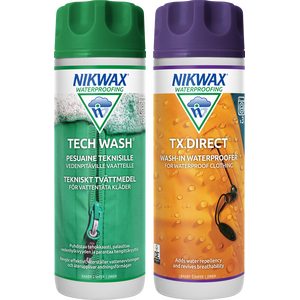
Care instructions for Gore-Tex and other membrane textiles
Outdoor activities, Climbing, Geocaching, Foraging, Winter sports, Alpine touring, Trekking, Care and repair, Snowshoeing, Backcountry skiing, Canoeing, Cycling by Varuste.net, 16.10.2023
Gore-Tex and other membrane materials are designed to withstand harsh conditions and keep the wearer dry and comfortable outdoors. To ensure your shell garments remain efficient for a long time, it is essential to take proper care of them. Here are some general care instructions for Gore-Tex garments and other similar membrane materials.
Washing shell garments
Wash your shell garments regularly to remove dirt, sweat, grease, and salt residues that can hinder the breathability of the shell jacket or other shell garments.We recommend using a detergent specifically designed for technical shell garments, which does not clog the pores of the shell. Avoid using regular powder or foaming detergents, fabric softeners, and bleaches, as well as basic detergents containing bleach. Check the care label on the product and the detergent instructions for the appropriate temperature and other guidelines: shell garments are usually washed at 30 or 40 degrees Celsius.
Before placing the garment in the washing machine, close all zippers and velcro fasteners to prevent them from damaging the garment itself or other textiles being washed in the machine. Note that it is advisable not to overfill the machine: especially when using reproofing agents, it is generally recommended to wash and treat no more than a couple of garments at a time.
> Always follow the washing instructions for the garment, and also take into account the instructions for use of the detergent.

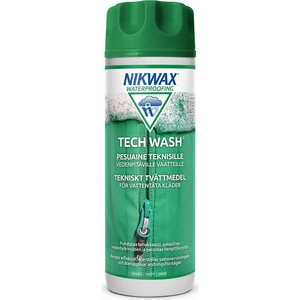
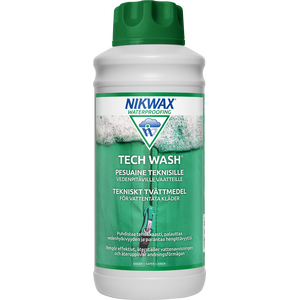
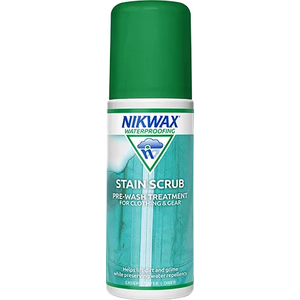
Drying shell garments
Dry the clothes in the machine at a low temperature or hang them outside to dry. Many modern washing machines nowadays have their own washing and drying program for outdoor products. Avoid too high temperatures, as they can damage the membrane layer or other tapes or glues that have been used on your garment.> Always check the garment's washing and drying instructions, as they may vary depending on the manufacturer and the membrane used.
Waterproofing
If you notice that water no longer beads off the surface of the garment, you may need to re-treat the membrane with a DWR (Durable Water Repellent) coating. There are various sprays or wash-in treatments available for this purpose. Always check the compatibility of the care product with your shell garment and follow the instructions. Some reproofing agents recommend a heat treatment to activate the coating. This can be done at a low temperature in a tumble dryer or drying cabinet if the garment's care instructions allow, or gently in the residual heat of a sauna. Be cautious, as excessive heat can ruin the membrane.
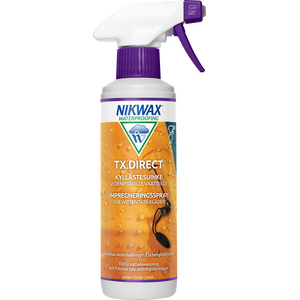
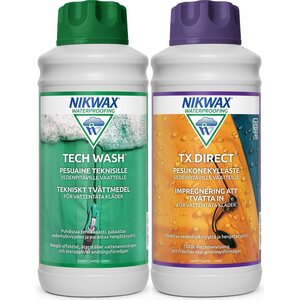
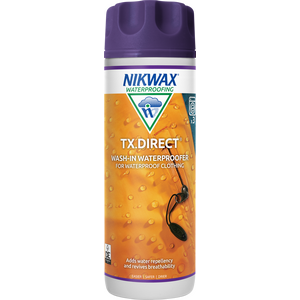
Treat your clothes properly
Avoid strong rubbing and tearing to avoid damaging the membrane or seams. Many shell garments designed for heavy use have reinforced areas that are most likely to be subjected to heavy wear and abrasion. If you are in the process of purchasing a new garment, consider this in your selection: if you plan to carry a heavy backpack, ensure that the area under the straps is reinforced.
> Be careful with sharp objects in your pockets and be cautious when scrambling over rocks or through bushes to avoid unnecessary cuts in your shell garment.
Repairing shell garments
If, despite all precautions, your garment gets a hole or tear, follow these steps:1) Clean the garment
Before repairing, ensure the garment is clean and dry. Remove any dirt and debris around the hole.
2) Obtain the necessary repair materials
There are various repair materials available for shell garments, such as Gore-Tex repair tape or patch material.

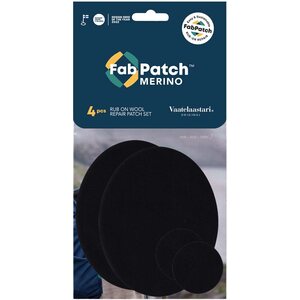
3) Cut and fit the repair material
Cut a piece of repair material slightly larger than the hole. Fit it over the hole and make sure it covers it completely.
4) Heat and press
Some repair materials require heat activation. In general, you can use an iron on low heat or a heat plate designed for the purpose. Read the repair kit's instructions regarding heat and time. Carefully press the repair accessory over the hole so that it adheres to the membrane.
5) Allow to cool
Allow the repaired area to cool and dry thoroughly before wearing the garment again.
6) Waterproofing if necessary
If the repair does not work completely and the garment is no longer completely waterproof, you can also consider a product that improves waterproofness, such as a DWR protective spray.
 reviews
reviews